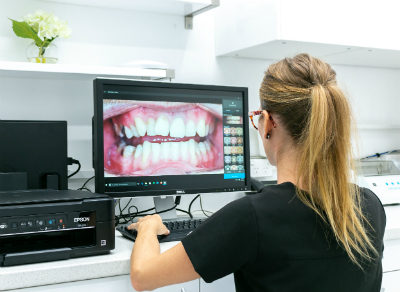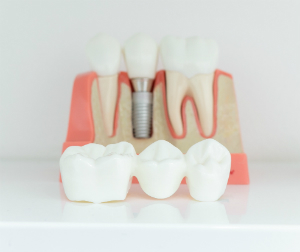Book an Appointment
(02) 93 000 999
For some of us, through our lives, we may encounter problems that only a missing tooth can bring. Missing a tooth can lead to:
An aesthetically unappealing look
Difficulty in chewing or eating certain food
Change in speech and facial profile
Other teeth shifting and moving into undesirable positions
If you have a missing tooth, or a few teeth that no longer contribute to your smile, dental implants may be a great solution. At Dentist Mandy, we perform dental implant surgery regularly to help patients who need to replace their missing teeth.

If you have a missing tooth, or a few teeth that no longer contribute to your smile, dental implants may be a great solution. At Dentist Mandy, we perform dental implant surgery regularly to help patients who need to replace their missing teeth.
Dental implants may be right for you if:
Your jawbone is healthy and fully matured
Your gums are healthy and disease free
You don’t have an illness which will impact on normal healing
You are missing teeth or are having teeth removed
You need to hold dentures or a dental bridge in place

A dental implant is a little metal piece which is similar to a screw. It is inserted into your jaw in the spot your tooth’s roots once occupied and then covered with a dental crown (or artificial tooth). The dental crown is matched to your existing teeth to retain a natural appearance.
This artificial tooth performs the functions of your original tooth and is custom made to match the rest of your smile in colour, shape and scale.
Dental implant surgery is usually completed over a couple of months in small stages. At Dentist Mandy, our first step is always to help you feel comfortable and confident with your decision and to make you aware of the process and desired outcomes.
Here is a roadmap of the stages involved in most dental implant procedures.
After your initial consultation with Dentist Mandy, we’ll arrange for some scans and Xrays to be taken to give our dentist a clear picture of your mouth
When you come into our rooms for the procedure, the dentist will administer an anaesthetic so that you are comfortable and pain free during the procedure. During this appointment, you will have minor surgery to place the dental implant into your jawbone.
There is then a period of 3-4 months whilst we wait and allow the jaw bone the time it needs to grow around the implant to secure it in its place.
After this time, we check that the implant is stable and that we have created a solid foundation for your new implant crown.
To make the customised artificial crown, we need to take an impression or mould of your entire mouth. Once we have achieved this, we will customise your new crown to place onto the dental implant.
As a final stage, we receive your customised crown and during your appointment, we screw or cement the artificial tooth or teeth into the dental implant foundation.
Yes, it is quite a lengthy process, but the benefits are intended to last for a long time!
The good news is that dental implants last for a very long time. In fact, most dentists recognize that, provided that you care for and maintain your teeth, gum and implants properly, dental implants last conservatively for at least 15 years. This is in a mouth free of gum disease.
On the other hand, an artificial tooth (or implant crown) that sits on top of the dental implant may require replacement due to wear and tear from everyday use. If you have abnormal grinding or other unfavorable habits, this may accelerate the need to replace the implant crown. That’s why it is important to factor the cost of future maintenance and replacement of the implant crown into your budget.
Post operative care with dental implant surgery is all about common sense. As with any minor surgery, you may experience a little bruising, some pain and swelling of both your face and gums. In some circumstances there may be minor gum bleeding. We do recommend that you take it easy on your mouth. This could involve eating soft foods after surgery, giving your mouth time to heal.
Effectively though, there is no specific or special care required for dental implants. You should treat your teeth to a proper cleaning regime with both flossing and brushing and listen to your body providing adequate rest and minimising stress.

Your dentist will also speak to you about the possible need for antibiotics post surgery. We know each patient is an individual with varying needs and requirements. Post surgery, we are here to answer any questions and to make sure that your transition to dental implants is as smooth as possible!
Taking care of your dental implant requires the same attention as maintaining a brand new car. Namely regular check ups and cleaning! A good oral health care routine will help reduce the risk of peri-implantitis (a fancy name for implant-related gum disease). Your dental implant is more likely to be affected by gum disease than your natural teeth, so flossing and cleaning around your dental implant daily is super important. This will help to prevent accumulation of bacteria and food debris. Regular professional dental cleaning is a must so that we can detect any problems before they become bigger issues.
It is possible to chip or fracture the implant crown just like your natural teeth. When this happens, it is likely that we need to replace the whole implant crown. Repairs to implant crowns is difficult in most situations due to the sensitive nature of the connecting screw. As mentioned earlier, if you suffer from abnormal grinding or put too much loading on the implant crown, it certainly increases the risk of damage. Therefore, sometimes we do recommend you use a protective splint at night time to reduce wear or delay the need of replacement.
